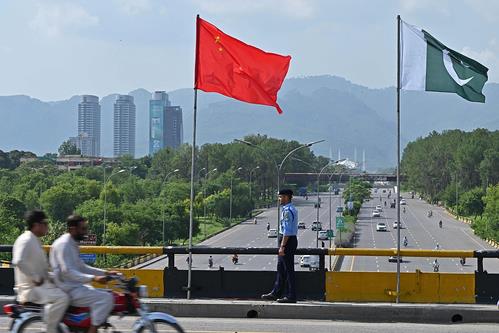US Shadow Looms Over Pakistan's Ties With China
Even the China-Pakistan Economic Corridor (CPEC) is not Islamabad's brainchild, but a spoke in Beijing's Belt and Road Initiative, which is aimed more at serving China's own ambitions, according to an article in Pakistan Today.
In the Middle East, the regional diplomatic order is shifting. Arab states are moving towards normalisation with Israel under the Abraham Accords, reshaping traditional alliances and potentially altering the balance of influence in the Muslim world, the article said. Even historically close partners such as Kazakhstan, which imports their locally assembled JF-17 fighter jets, and Turkey are gradually adopting more flexible positions towards Tel Aviv. Afghanistan remains unstable and unreliable as a trade and security partner. Iran, meanwhile, faces deepening international isolation and has had occasional military tensions with Pakistan, such as last year's cross-border skirmishes, the article further states.
The article also highlights that Islamabad has not succeeded in implementing any economic project planned with Central Asian countries such as Kyrgyzstan, Tajikistan, and Uzbekistan.
"All of this leaves Pakistan with one major and consistent ally, China. While the partnership with Beijing remains central to our economic and security strategies, it is not immune to the turbulence of global politics. The delicate balancing act Islamabad must perform between deepening US engagement and maintaining Chinese trust is becoming increasingly precarious. Even the much-celebrated CPEC, now entering its second phase, is exposed to vulnerabilities from regional instability, shifting geopolitical alignments, and global power competition," the article laments.
It also highlights that Islamabad's recent flirtation with the idea of crypto-mining partnerships with the USA seems less like a serious economic pivot and more like a political talking point. "Our history of announcing ambitious projects without the institutional capacity or long-term follow-through suggests that such ventures are far more likely to evaporate than materialise."
The article also underlines that on the strategic front, Pakistan's room to manoeuvre is narrowing at an alarming rate. The country is not part of BRICS, the rapidly expanding economic bloc that now accounts for a significant share of global GDP and is increasingly shaping the future of trade and development financing outside Western frameworks. India's Act East Policy, initiated in 2012, has deepened its integration with ASEAN economies and strengthened security partnerships across East Asia, while leaving Pakistan excluded from emerging regional supply chains.
If New Delhi were to further revise its policy towards the Indian Ocean Rim Association, Pakistan's maritime trade routes could face additional strategic restrictions, effectively tightening a noose around our sea-based economic lifelines, the article added.

Legal Disclaimer:
MENAFN provides the
information “as is” without warranty of any kind. We do not accept
any responsibility or liability for the accuracy, content, images,
videos, licenses, completeness, legality, or reliability of the information
contained in this article. If you have any complaints or copyright
issues related to this article, kindly contact the provider above.
Most popular stories
Market Research

- Poppy Seed Market Size, Share, In-Depth Insights, Opportunity And Forecast 2025-2033
- Daytrading Publishes New Study On The Dangers Of AI Tools Used By Traders
- Origin Summit Debuts In Seoul During KBW As Flagship Gathering On IP, AI, And The Next Era Of Blockchain-Enabled Real-World Assets
- Chicago Clearing Corporation And Taxtec Announce Strategic Partnership
- Bitmex And Tradingview Announce Trading Campaign, Offering 100,000 USDT In Rewards And More
- ROVR Releases Open Dataset To Power The Future Of Spatial AI, Robotics, And Autonomous Systems






















Comments
No comment